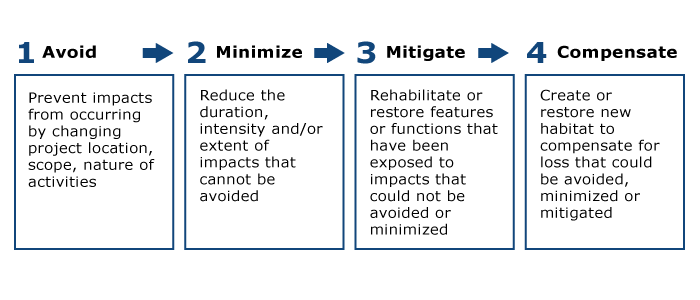Ecological Offsetting
Ecological Offsetting Policy
Our Ecological Offsetting Policy is one of the ways we’re trying to improve our watershed’s health. We launched the Policy in 2017 in order to respond to the impacts on the landscape as a result of development. The concept of ecological offsetting is not new. It has been practiced around the world for several years.
Our Policy requires property developers to compensate for the negative environmental consequences of their activities on the land.
Ecological Offsetting is a tiered plan.
- First we seek to avoid any negative environmental impact from development.
- If it can’t be avoided, then we seek to minimize the impact as much as possible.
- If there are impacts, then we work with the property developer to undertake rehabilitation efforts to make up for the loss.
- If that’s not possible, then we require financial compensation so we can create or restore new habitat through a compensation program. The route of compensation is considered a last resort. If we take this route we seek compensation at a minimum ratio of 2 to 1 or 3 to 1, depending on the type of habitat being impacted. For example, a 2 to 1 compensation ratio could look like this: If 1 hectare of forest is cut down, 2 hectares of forest must be planted to replace it.

We believe Ecological Offsetting is an important step towards achieving environmental sustainability in our watershed and across Ontario. Our Ecological Offsetting Policy was approved by our Board of Directors in May 2017. The full details about the Policy can be found here.
Tracking Our Efforts
To ensure transparency, a record of the collection and allocation of funds received through the Policy will be made available to the Building Industry and Land Development Association (BILD), watershed municipalities and other interested stakeholders, on an annual basis, in a report to our Board of Directors.
The first compensation project funded through this Policy is in East Gwillimbury in York Region, where we created new wetland habitat at Rogers Reservoir Conservation Area. The new wetland was constructed during the winter and spring of 2018, next to the Nokiidaa Trail, west of Holland River Blvd.
Important Notice:
Bill 23
With the passing of Bill 23, More Homes Built Faster Act, there are several changes that have impacted our permitting role as well as our work in planning and development reviews.
For clarification on these roles, please review Current Impacts of Bill 23, including the Areas of Review Chart.
Office Hours
Our new public office hours will be Tuesdays, Wednesdays and Thursdays from 8:30 am to 4:30 pm.
We highly recommend making an appointment in advance to ensure there is staff available to help you.
Our team continues to work remotely. We are available via email, video or voice conference using Microsoft Teams or ZOOM. Please reach out to your planning or regulations contact by email about your file.
![]() Who to Contact
Who to Contact
Permits & Regulations
✆ 905-895-1281
✆ 1-800-465-0437 Toll free
✉ regulations@lsrca.on.ca
Submit electronic applications to
✉ applications@LSRCA.on.ca
![]() General Inquiries
General Inquiries
Planning:
Emma Dias e.dias@LSRCA.on.ca
Regulations: regulations@LSRCA.on.ca
Read our frequently asked questions

